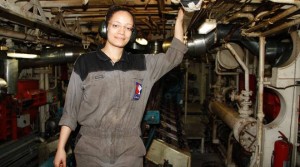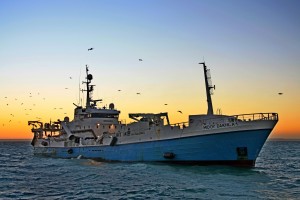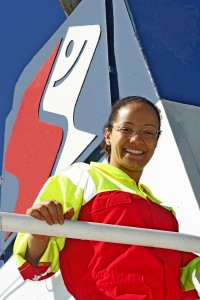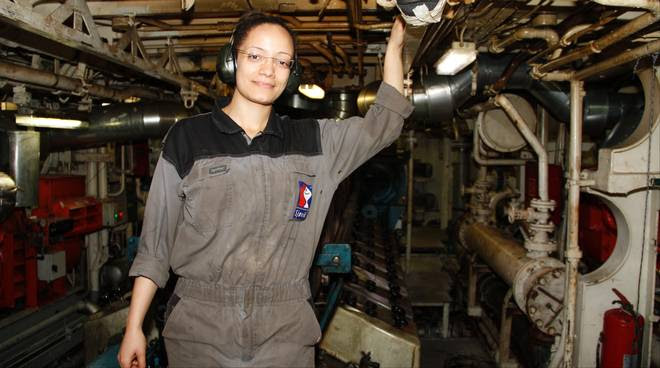Intrafish
Ola Sletten

In a rigidly traditional culture and industry, engineer is bucking the odds and carving out a successful career.
Sjovik pelagic trawler Midoy Dakhla 1, which operates from Dakhla in Western Sahara, is a unique ship, and one of the things that makes it unique is 23-year-old Youssra Zguaoua, the first woman to work as crew on a Dakhla fishing vessel in what is traditionally an entirely male working environment.
Zguaoua, who hails from the Mediterranean port of Al Hoceima in northern Morocco, is an engineering graduate from the Technological Institute of Maritime Fisheries in Laayoune, which is where her interest in working in fishing began.
“Several friends wondered how I decided to become a fishing vessel engineer, but I was curious to find out more about the lives of people working at sea,” Zguaoua told IntraFish.

“I saw it as a big challenge because I wanted to show that women with my background also could work within a male-dominated environment.”
Engineering is the basis of modern technology, especially heavy industry,” Zguaoua noted.
“Among other things, at the institute we studied general mechanics, electricity, welding, electronics, electrical, refrigeration, industrial drawing, technical management, first aid, rescue and fire safety.”
“Once I became the first woman to receive this diploma, it became very difficult to engage with the maritime sector,” Zguaoua said. “After four months of job searching, I was accepted on a longliner with 36 crew.”
The skipper refused to allow Zguaoua to work in the engine room, so she had to work on the bridge.
“To put it mildly I was shocked to see the working conditions,” she said. “The boat was short of all kinds of equipment and there would have been serious problems if there had been a fire or an emergency on board.”
The fishing trips could last over 20 days, and Zguaoua realized on the first day it was not going to be easy.
“It was absolutely awful, not least due to the extremely rigid mentality towards women,” she said. “Hygiene conditions were miserable, with poor accommodation and no shower on board.”
Despite the difficulties, Zguaoua stayed with the job for four months until an opportunity to join Sjovik Morocco’s pelagic trawler Midoy Dakhla 1 arose, following a letter to the Ministry of Fisheries explaining that despite her degree, job opportunities for women in the field were limited.
“It’s the technology that gives the woman the opportunity to participate in this area because the technology requires less physical effort,” she said. “Intelligence plays an important role in maintaining the position of a woman in a team of men.”
Zguaoua had no illusions that she would change the minds of everyone around her, though.
“Because I’m Moroccan, I have to accept the behavior pattern of my country’s fishermen,” Zguaoua told IntraFish. “I mean knowing the views of every man who works with me.”

Zguaoua said there are many “open-minded” men who can understand and accept a woman as an equal partner on a crew.
“On the other hand, it is a reality that the majority do not accept these things,” she said and added that coping with sexual harassment is the greatest challenge.
“Another difficulty is the lack of trust and the problem of gaining support for suggestions from women. In most areas there are many men are unable to accept that the women also have brains and are able to think for themselves.”
Tradition and religion frequently cause complex situations that have the potential to prevent development, not just in Morocco, but across the Middle East. According to Zguaoua, a significant problem is that there are many who choose to respect tradition rather than religion.
“If a man accepts a woman within a skilled workplace, that person thinks he is civilized, which is something I have to accept,” she said. “Then I have also been told that it is forbidden that women work alongside men. Knowing there are a lot of different opinions I just have to accept attitudes of colleagues with whom I deeply disagree.”
The team Zguaoua works with is made up 90 percent of Moroccan men.
“Sometimes there are colleagues who give me orders and there can be friction – primarily because I’m a woman,” she said.
Zguaoua prefers to deal with conflicts herself, and doesn’t like to take her problems to superiors.
A new breed of trawler, a new breed of crew?
The Midoy Dakhla 1 is a well-equipped trawler, Zguaoua said.
“At Sjovik Morocco I have found what I had not experienced at other workplaces – a professional crew providing professional advice,” she said. “It was a pleasant surprise to work with a crew who appreciate that a woman can also take part in work on a fishing vessel.”
Sjovik deputy CEO Daniel Sjøvik said gender equality is central to the company’s mission.
“It’s great that one of our female employees aboard Midoy Dakhla 1 is happy to have been treated with equal respect by her Norwegian counterparts,” he said. “The work of transferring company policy to the local crew and the staff is extremely important.”







